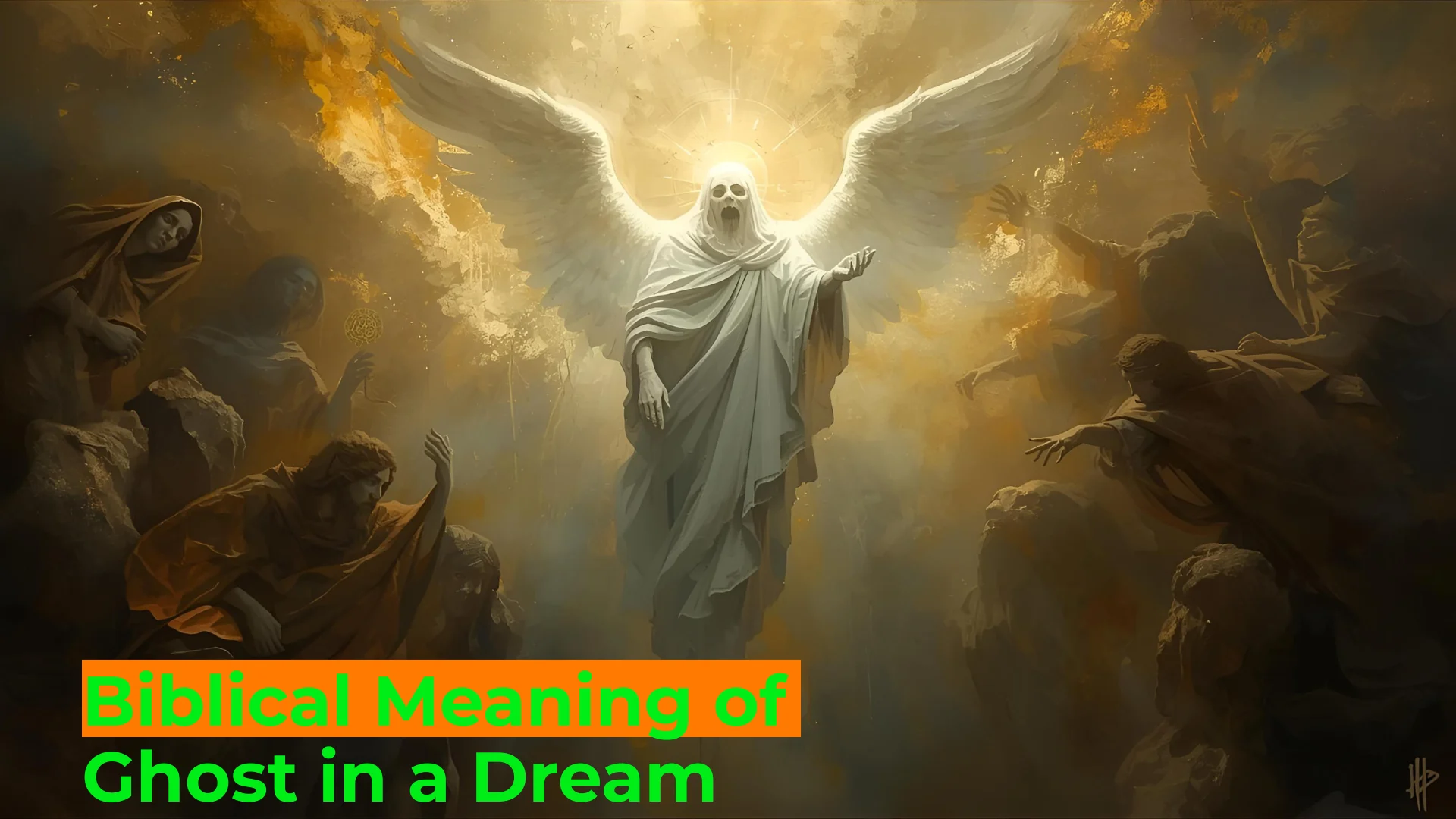Have you ever woken up in the middle of the night, heart racing, after seeing a ghost in your dream? Many of us have experienced these mysterious dream encounters that linger long after we open our eyes. For some, such dreams feel like warnings. For others, they carry a sense of comfort, like a visit from a loved one who has passed on.
In biblical tradition, dreams are not random — they are often viewed as channels of divine communication. The appearance of a ghost in a dream, therefore, is not just a spooky event; it can carry deep spiritual messages, psychological meanings, and cultural symbolism.
In this article, we will dive deep into the biblical meaning of ghost in a dream, exploring its origins, interpretations, and symbolic layers — from scripture to psychology, from cultural debates to modern healing perspectives.
📜 Historical & Anthropological Background
The concept of ghosts, spirits, and apparitions is ancient and widespread:
- Biblical roots: In the Bible, ghosts were often described as spirits of the dead or manifestations of divine messages. For example, in 1 Samuel 28, King Saul encounters the spirit of the prophet Samuel through the medium at Endor.
- Jewish tradition: In early Jewish belief, spirits of the dead were thought to rest in Sheol, but sometimes they were believed to appear in dreams or visions.
- Ancient cultures: Egyptians, Greeks, and Mesopotamians all described ghostly presences in dreams. These were often seen as omens — warnings, blessings, or unsettled spirits seeking resolution.
- Anthropological perspective: Ghosts in dreams are often linked to cultural memory, ancestor veneration, and unresolved grief. Across societies, dreams of spirits were understood as bridges between the living and the unseen.
Thus, the biblical view of ghosts in dreams did not develop in isolation — it evolved within a broader tapestry of human attempts to understand death, the afterlife, and divine messages.
🧠 Psychological & Healing Interpretations
Modern psychology gives us another lens to interpret ghost dreams:
- Carl Jung’s perspective: Jung often spoke of dreams as messages from the unconscious. A ghost could symbolize the “shadow self” — parts of us we suppress but that still haunt us.
- Unresolved grief: Dreaming of a ghost may reflect unprocessed emotions about someone who has passed away.
- Fear & anxiety: Ghosts often represent hidden fears or unresolved guilt.
- Healing symbolism: Seeing a ghost in a dream can also indicate a stage of healing, where the subconscious is working through loss and integrating it into the psyche.
In this sense, a ghost in a dream is not always negative. It can be a psychological call for healing, acceptance, and closure.
🙏 Spiritual & Religious Perspectives
✝️ Christian / Biblical View
In Christian belief, ghosts in dreams can carry several meanings:
- A warning dream, urging repentance or spiritual vigilance.
- A test of faith, where the dreamer must discern between divine messages and deceptive spirits.
- A comforting vision, where God allows the memory of a loved one to appear as reassurance.
🌍 Cross-Cultural Perspectives
- Native traditions: Many Native American tribes see ghost dreams as encounters with ancestors, carrying wisdom or warnings.
- Hinduism & Buddhism: Ghosts (or restless spirits) appear in dreams when karmic cycles are unresolved.
- Modern spirituality: In New Age traditions, ghost dreams symbolize spiritual awakening and communication between dimensions.
🔮 Deeper Symbolism of Ghost Dreams
Ghosts in dreams can symbolize:
- Strength & resilience: Facing fears and moving beyond them.
- Protection: Ancestral spirits watching over you.
- Inner healing: Confronting suppressed emotions.
- Transition & rebirth: Letting go of the old to embrace transformation.
👩 vs 👨 Gender-Based Meanings
Dream interpretation often shifts depending on the dreamer’s gender:
- For women: A ghost may symbolize unresolved maternal energy, protection, or fears tied to vulnerability.
- For men: Ghosts may represent fatherly guidance, authority figures, or struggles with power and responsibility.
Biblically, dreams often reflected roles and responsibilities of the dreamer — so gender-specific interpretations remain relevant.
📍 Placement & Body Location Symbolism
In biblical times, dreams were not just visual — they often carried symbolic locations that conveyed meaning. Applying this to ghost dreams:
- Hand: Symbol of action. A ghost near your hand could mean hesitation in decision-making.
- Chest/heart: Represents emotions and faith. A ghost here may point to grief or love.
- Back: Symbol of past burdens. A ghost at your back suggests unresolved history.
- Thigh/legs: Signify movement. Ghosts here may warn of obstacles in life’s journey.
🎨 Design & Color Symbolism of Ghosts in Dreams
Colors in dreams often carry biblical and psychological meanings:
- White ghost = purity, divine presence, or peaceful closure.
- Black ghost = fear, deception, or spiritual battle.
- Blue glow = peace, divine protection.
- Red aura = passion, danger, or warning.
- Gray spirit = confusion, uncertainty, or transition.
⚖️ Cultural Debate: Respect vs. Appropriation
Talking about ghosts, spirits, and dream meanings requires cultural sensitivity:
- Respect: Many Native and Indigenous traditions see ghost dreams as sacred. These beliefs should be honored, not commercialized.
- Appropriation: Using ghost symbolism superficially (like in media or fashion) can strip it of its sacred meaning.
- Balance: Exploring ghost dreams from a biblical perspective should also respect cultural diversity without diminishing traditional values.
📖 Real-Life Stories & Testimonies
- Maria, 42: After losing her father, she dreamt of him as a calm ghostly presence, whispering “I’m at peace.” She woke with a sense of closure.
- David, 30: He dreamt of a dark ghost chasing him, and later realized it mirrored his hidden addiction struggles. Facing it helped him heal.
- Hannah, 55: Her ghost dream led her to pray more deeply, and she interpreted it as God’s call to strengthen her faith.
These stories show that ghost dreams often reflect deeply personal and transformative experiences.
❓ FAQs: Biblical Meaning of Ghost in a Dream
1. Is seeing a ghost in a dream always negative?
No. Biblically, it may be a warning, but it can also be comforting, showing ancestral presence or divine reassurance.
2. Does the Bible support ghost encounters?
The Bible records spiritual encounters (e.g., Samuel’s spirit), but also warns against necromancy. Discernment is key.
3. Can ghost dreams mean someone is watching over me?
Yes. Many interpret them as visits from loved ones, offering comfort and guidance.
4. How should I respond after such a dream?
Pray, reflect, and journal your feelings. Seek clarity through scripture and spiritual discernment.
5. Do ghost dreams predict the future?
Not always. They often reveal the present state of your heart, mind, and spirit more than future events.
🌈 Conclusion: The Ghosts That Teach Us
Dreaming of a ghost may stir fear, but it can also open doors to deep spiritual reflection, healing, and transformation. In biblical interpretation, ghosts remind us of divine mysteries, the thin veil between worlds, and the importance of discerning truth.
Rather than dismissing such dreams, embrace them as symbols of growth, healing, and connection — whether to God, to loved ones, or to your own inner self.


